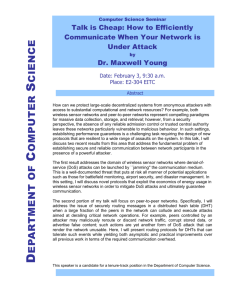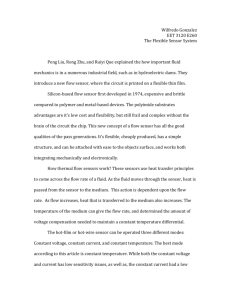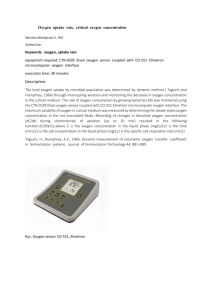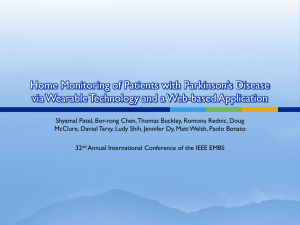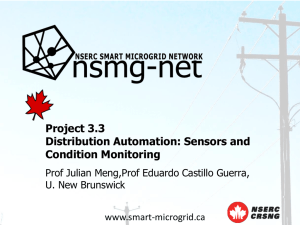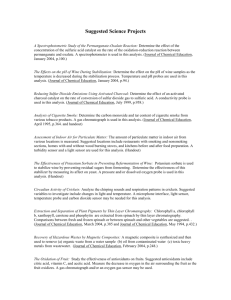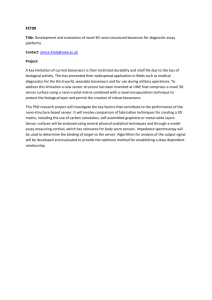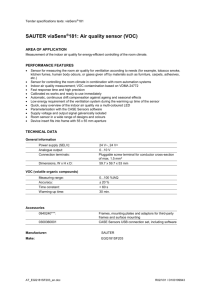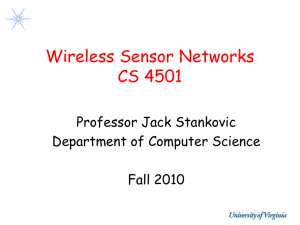the final report.
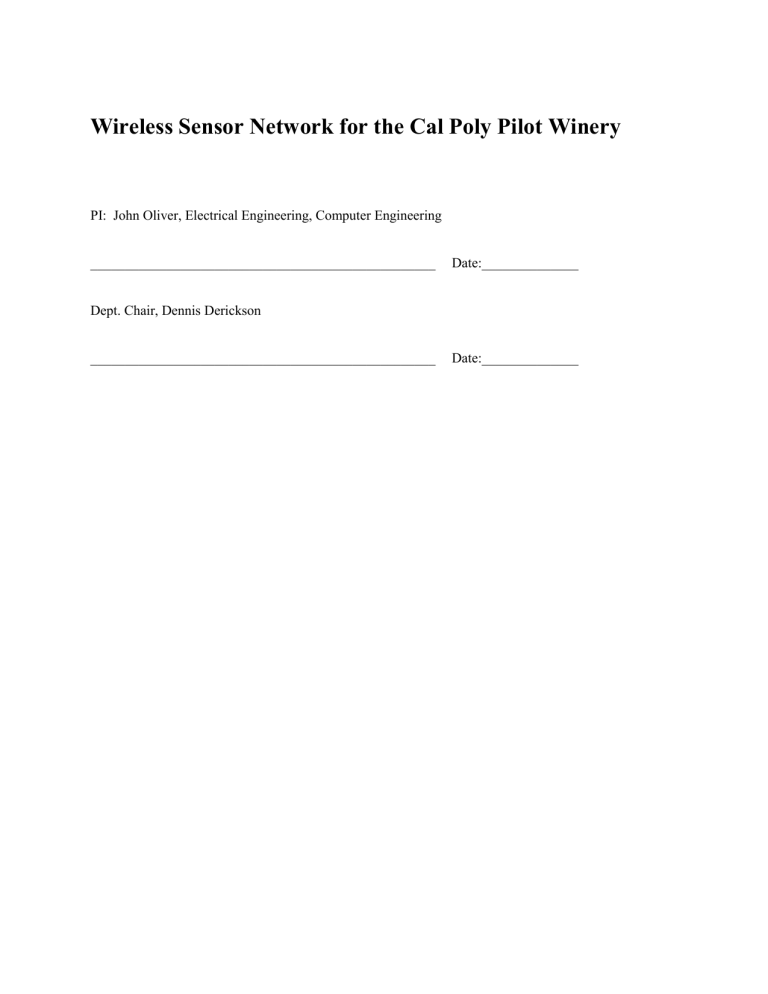
Wireless Sensor Network for the Cal Poly Pilot Winery
PI: John Oliver, Electrical Engineering, Computer Engineering
__________________________________________________ Date:______________
Dept. Chair, Dennis Derickson
__________________________________________________ Date:______________
Wireless Sensor Network for the Cal Poly Pilot Winery
A Proposal for CP Connect
PI: John Oliver - Assistant Professor, Electrical Engineering, Computer Engineering
Kathy Chen - Professor, Materials Engineering
1. Project Objectives
The goal of this project is to develop a low-cost temperature measurement automation system for small-scale wine makers.
Every year, students in the enology program at Cal Poly get the opportunity to make wine using the pilot winery. During fermentation of grapes, temperature readings must be taken at a minimum of 4 hour intervals over a three week period. This measurement requirement is a significant challenge to the small-scale wine maker, requiring a high amount of labor.
We propose creating a wireless sensor network that will automate temperature measurements, collect the data wirelessly and disseminate the data on the Internet. Fermentation is typically done in large plastic bins, an example is shown on the left of Figure 1. These bins are about three feet high and five feet on each side. During fermentation, grapes and other materials are placed in the bin, and a lid is placed on top of the bin. Every 4 hours, a temperature measurement must be made. If the temperature of the ferment is outside of a certain threshold, the winemaker must take corrective actions.
The proposed sensor network will consist of a battery powered sensor with wireless capabilities be placed inside the fermentation box during fermentation. The sensor will be able to take temperature measurements for the entire duration of fermentation and transmit temperature information periodically to a wireless network. Since fermentation boxes may be moved out of the wireless range of the sensor, a network of wireless nodes (which are also sensor boards, for simplicity) will be used to provide a robust (multi-hop) channel for communication. Data collected by the wireless nodes will then be disseminated by a PC using speadsheets and realtime updates that can be checked remotely.
It is our hope that this wireless sensor network will enable enology studnents to monitor the ferment’s temperature easily. Additionally, through automation of temperature measurements, we will be able to provide consistent and more frequent temperature data. This abundance of data should be able to be used to reinforce the art of wine making.
Figure 1. Wireless Sensor Network System Diagram
2. Project Significance
This project is a multi-disciplinary project between three faculty Matt Brain (Cellar Master,
CAFES), Professor Kathy Chen (MATE) and Assistant Professor John Oliver(EE/CPE) and is currently engaging two students: Caitlin Devaney (MATE), Kerry Sharfglass (CPE). It is our belief that this project can turn entrepreneurial due to the large number of wine makers on the central coast. Finally, this project has significant opportunities for expansion. Beyond fermentation temperature, acidity and sugar concentrations are also of interest to wine makers and could be incorporated into the sensor network as future student projects.
3. Schedule
This project has already started, Students Caitlin Devaney and Kerry Sharfglass already starting some design work in Fall 2011. Pilot winery site visits have already been completed and initial software development has begun. The remaining timeline for this project:
January 2012: Purchase required electronics, complete design and analysis of sensor node enclosure
February 2012: Manufacture and assemble electronics and enclosures for 10 sensor nodes.
Develop necessary user-interface software to enable CAFES students to use the sensor network.
April 2012: Deploy sensor network in the Pilot Winery. Capture test data and begin calibration process.
May 2012: Re-calibrate the sensor network, publish conference paper.
Fall 2012: Use the sensor network on real fermentation after the fall harvest.
4. Required Resources
Texas Instruments has already donated enough electronics for 5 sensor nodes. It is our desire to have enough electronics for 10 sensor nodes in the wireless network, to provide a robust sensor network. To develop the electronics, one CPE student will be required under the direction of
Professor Oliver.
The end sensor nodes that are in the fermentation bins need to be put in an enclosure that has food-grade safety, and allows for accurate temperature measurements to be made. Materials cost of 5 enclosures will be required and the design will be supervised by Professor Chen.
Finally, access to the Pilot Winery has been established with the help of Cellar Master Matt
Brain. Continued access to the pilot winery will be required.
5. Dissemination
The field of sensor networks has several conferences, some which focus more on the practical implementation of sensors networks. One such conference is the IEEE SENSEAPP conference, which has a paper submission deadline at the end of May. The winery sensor network could make a good submission to such a conference.
Additionally, standard senior project reports will be published via the digital commons.
6. Budget
This project will be completed as part of student’s senior projects, and therefore will not require release time for faculty or student pay. There are some small materials costs that need to be covered, and travel and conference fees for one faculty and two students.
(5) Wireless sensor board (EZ430-RF2500)
(5) Custom enclosures for in-situ wine temperature sensors
$250
$250
Travel to conference (domestic) for 3 people
Hotel, 3 nights
Conference Fees
$1500
$300
$500
________________________________________________________________
Total $2800
